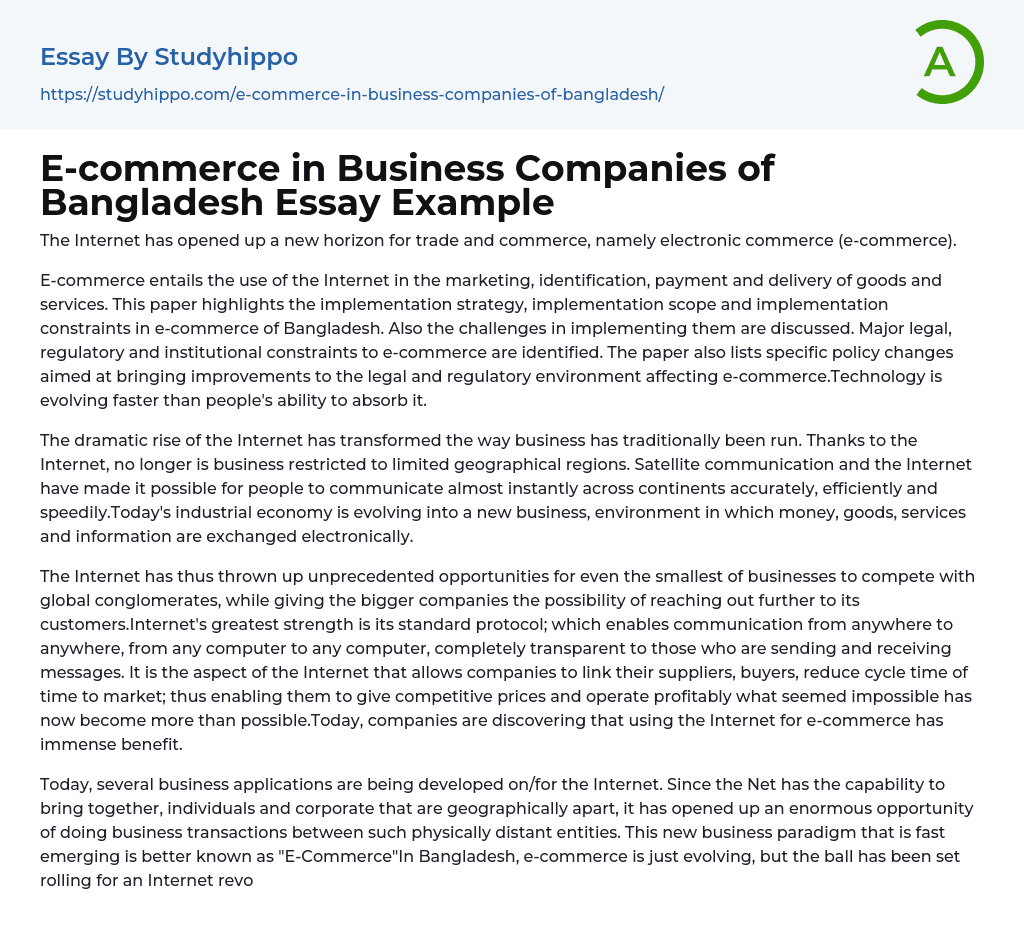The emergence of the Internet has given rise to electronic commerce (e-commerce), which presents a new opportunity for trade and commerce.
The utilization of the Internet for promoting, identifying, paying and delivering goods and services is known as e-commerce. This essay focuses on Bangladesh's e-commerce implementation strategy, scope and constraints, including obstacles related to their implementation. It also recognizes primary legal, regulatory and institutional constraints hindering e-commerce growth. Specific policy changes are included in the essay aimed at enhancing the legal and regulatory framework impacting e-commerce. Finally, with technology advancing rapidly, people's ability to comprehend it is falling behind.
The advent of the Internet has transformed conventional business operations, eliminating geographical limitations. Thanks to satellite communication and the web, rapid, precise and effective intercontinental communication is now achievable. This shift has led to an electronic business landscape where transact
...ions for money, goods, services and information are commonplace.
The Internet presents exceptional opportunities for businesses of all sizes to compete with larger corporations, while also allowing bigger companies to broaden their customer base. The primary advantage of the Internet is its standard protocol that permits effortless communication between any two computers worldwide. This connectivity enables businesses to connect with suppliers and buyers, thus reducing market cycle time and enabling more competitive pricing and profitable operations. Consequently, utilizing the internet for e-commerce has become increasingly advantageous for companies.
The Internet has facilitated connectivity between people and businesses, enabling the development of numerous business applications for conducting transactions over long distances. This is referred to as "E-Commerce" and presents significant opportunities. Bangladesh has increasingly embraced this new paradigm, which was once perceived as a luxury but is now a reality. The country
sold only 1000pcs in 1990, but it has now surpassed one lakh.
The potential for e-commerce growth in Bangladesh is significant, given the presence of over 60 ISPs and more than 200 thousand internet users. The internet has opened up opportunities for electronic commerce (e-commerce) that use sophisticated data transfer networks to connect suppliers and customers worldwide, regardless of their location. E-commerce platforms are useful for marketing, identification, payment processing, and product delivery.
Electronic commerce, known as e-commerce, encompasses the process of processing orders and securing Electronic Fund Transfer (EFT) payments on company websites. E-markets are online platforms that connect multiple buyers and suppliers to match supply and demand while reducing transaction costs and cycles, making them particularly beneficial for collaborative business activities. By utilizing an e-marketplace, goods and services suppliers can publish their catalogs for numerous buyers to access. These markets also offer value-added services such as automated documents for faster negotiations, decision-support information, company profiles, financial services for credit checks, online transaction processing, and efficient means of fulfillment. The "e" in e-commerce denotes internet use while "commerce" refers to conducting business activities through it.
The concept of e-commerce involves conducting business electronically, specifically through the Internet. The term can be broken down into two parts: "e," referring to online activities, and "business," which represents commerce. This includes automating transactions between businesses and consumers, as well as between businesses themselves, while utilizing secure and dependable connections.
E-commerce is the use of Web-based technologies to market, buy, sell, and support goods and services through electronic media. The definition now includes business conducted over the Internet, even between unknown parties. E-commerce covers the entire process of developing, marketing, selling, delivering,
servicing, and paying for products and services online. It serves global virtual communities of customers with a worldwide network of business partners using resources like the Internet and other computer networks. Bajaj and Nag5 define e-commerce as paperless exchange of business information using EDI (Electronic Data Interchange), Electronic mail, Electronic Bulletin Boards (EBBs), Electronic Funds Transfer (EFT) or other network-based technologies that automate manual processes and paper transactions while also helping organizations move towards a fully electronic environment.
The broad scope of e-commerce, or conducting business electronically, includes a variety of activities in both the business-to-business and business-to-consumer markets. These activities involve electronic trading of goods and services, online delivery of digital content, electronic fund transfers, share trading, auctions, collaborative design and engineering, sourcing online, public procurement, direct consumer marketing and after-sales service. E-commerce encompasses products including consumer goods as well as services.
The online business revolution is undoubtedly dominated by e-commerce, which embodies the passion and focus of a rapidly expanding market encompassing information services, financial services, and legal services.
The essence of this idea lies in conducting online business and is much deeper than a mere catchphrase or superficial political stance.
- Chief Executive Officer essays
- Convenience Store essays
- Firm essays
- Training And Development essays
- Unilever essays
- Variable Cost essays
- Virgin Group essays
- Bargaining essays
- Entity essays
- Pest analysis essays
- Email essays
- Hypertext Transfer Protocol essays
- Marshall Mcluhan essays
- Virtual Learning Environment essays
- Web Search essays
- Etiquette essays
- Mainstream essays
- Vodafone essays
- Web Search Engine essays
- Bangladesh essays
- China essays
- Hong Kong essays
- India essays
- Japan essays
- Kuala Lumpur essays
- Malaysia essays
- Manila essays
- Pakistan essays
- Philippines essays
- Singapore essays
- Vietnam essays
- Vietnamese essays
- John Locke essays
- 9/11 essays
- A Good Teacher essays
- A Healthy Diet essays
- A Modest Proposal essays
- A&P essays
- Academic Achievement essays
- Achievement essays
- Achieving goals essays
- Admission essays
- Advantages And Disadvantages Of Internet essays
- Alcoholic drinks essays
- Ammonia essays
- Analytical essays
- Ancient Olympic Games essays
- APA essays
- Arabian Peninsula essays
- Argument essays




